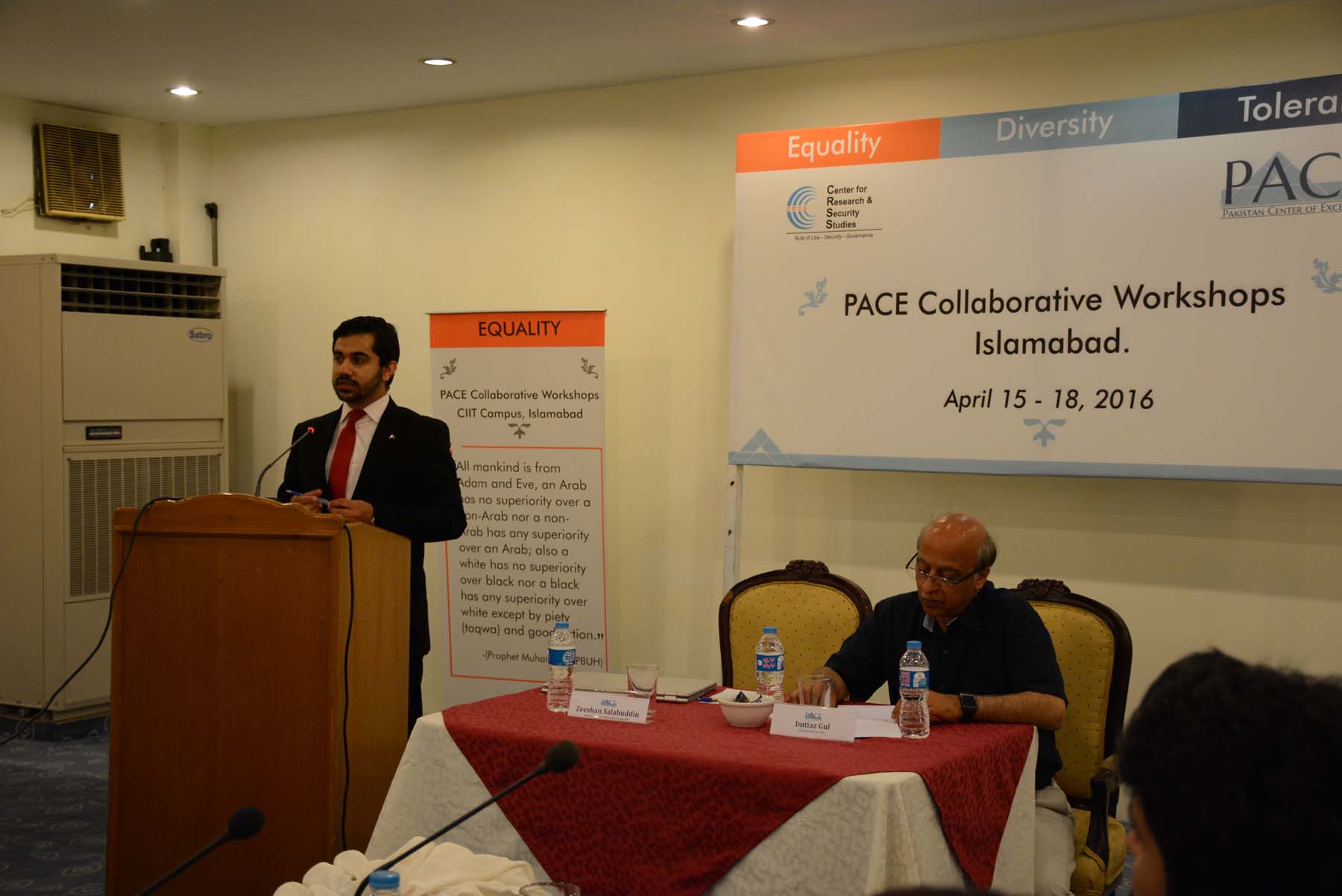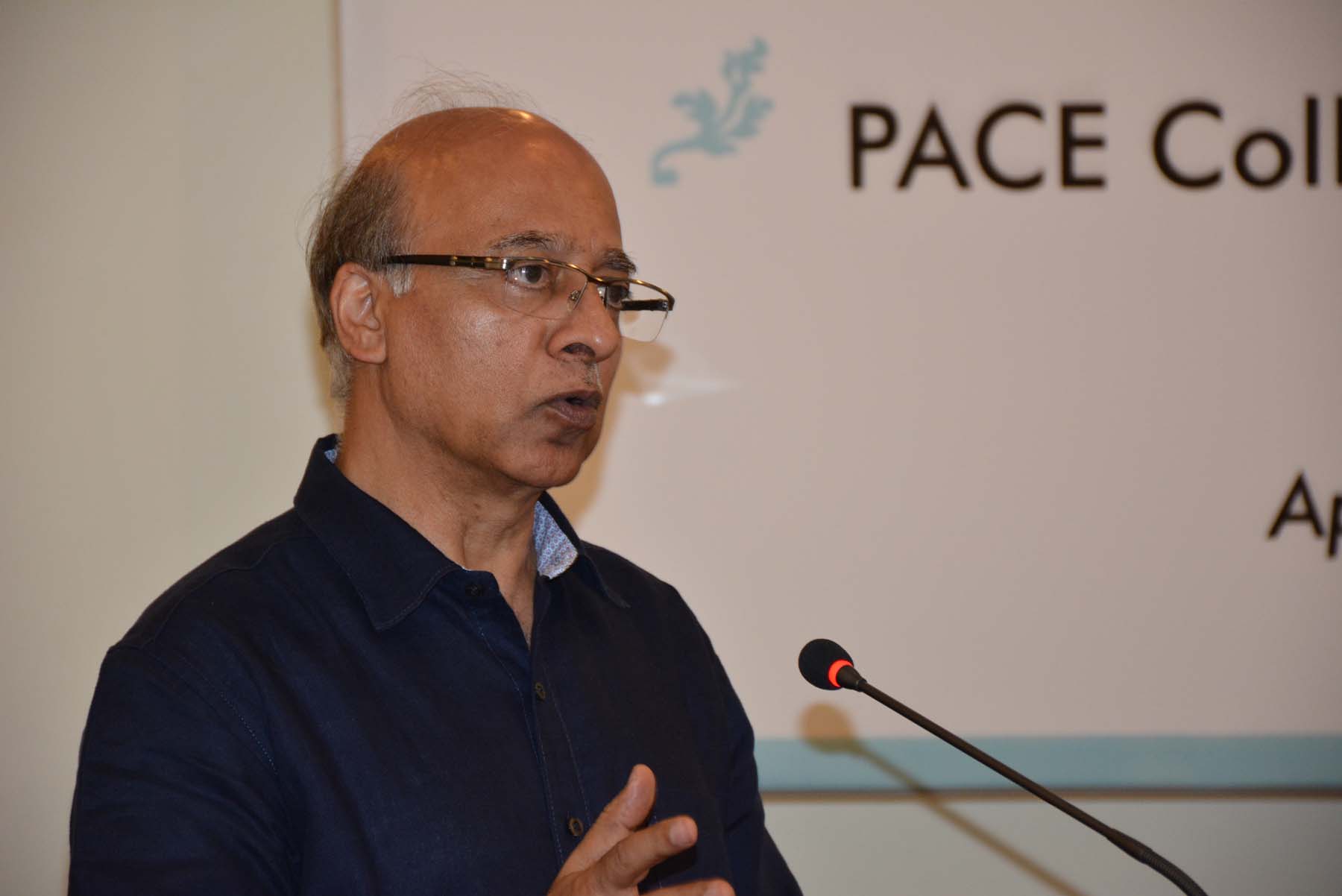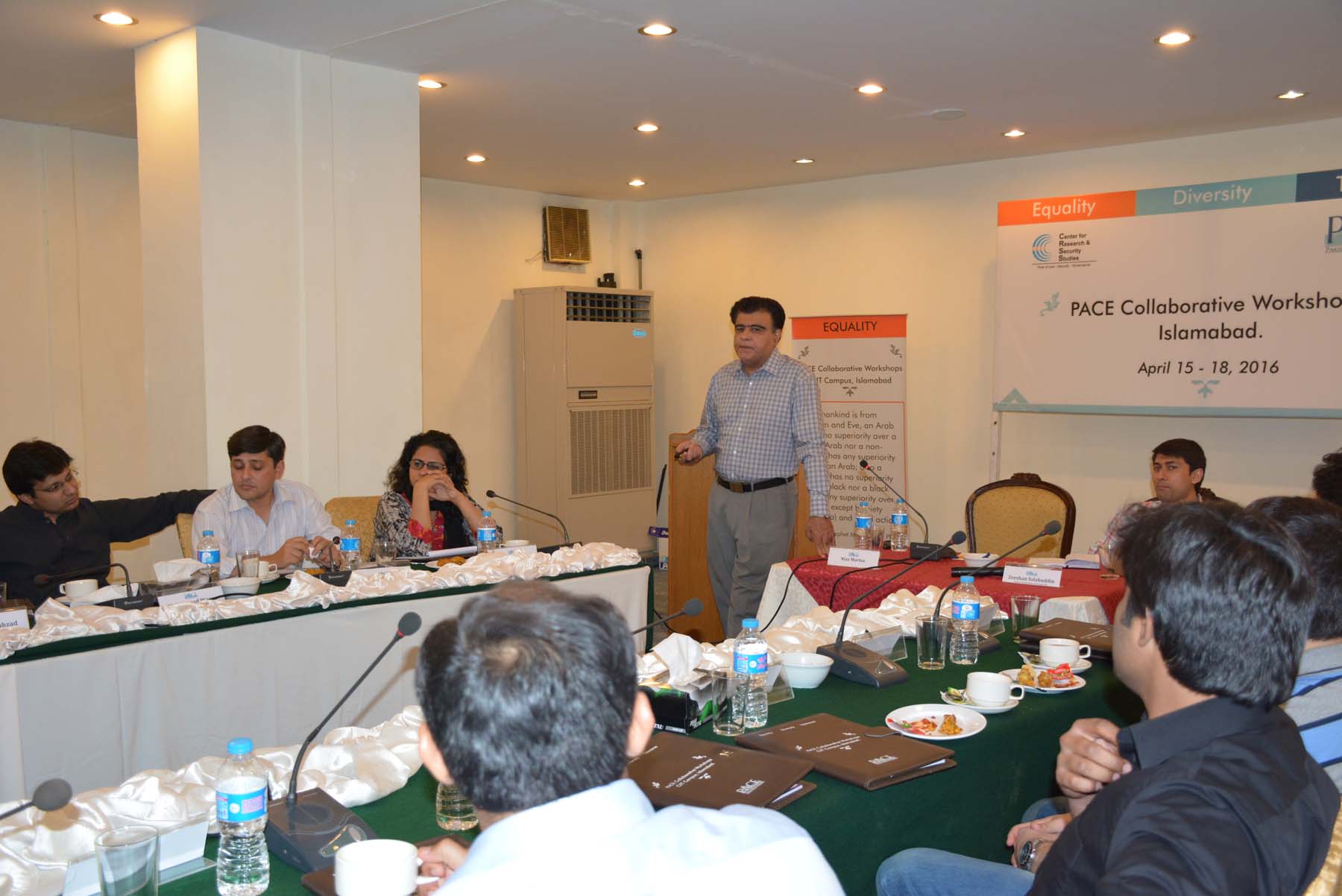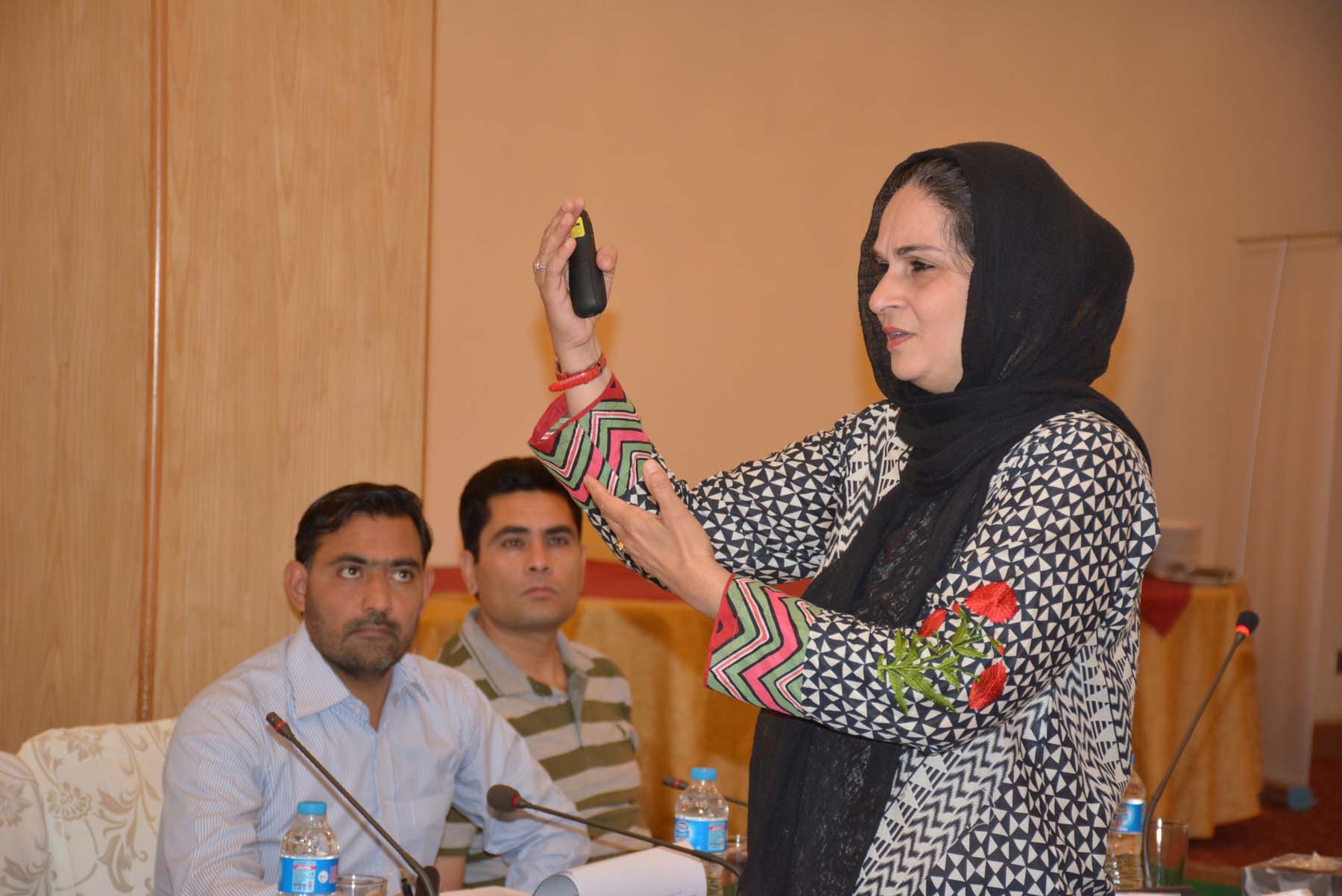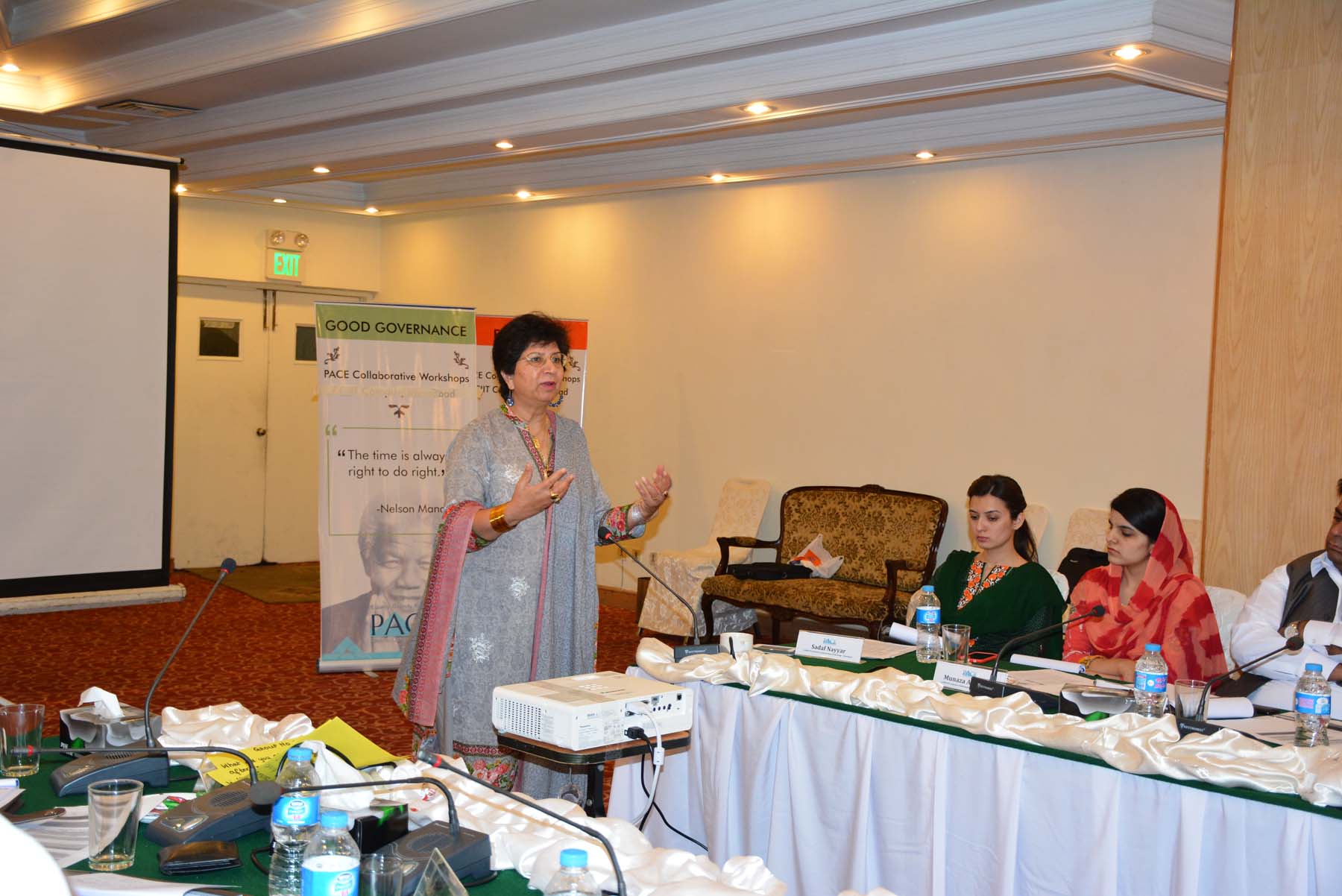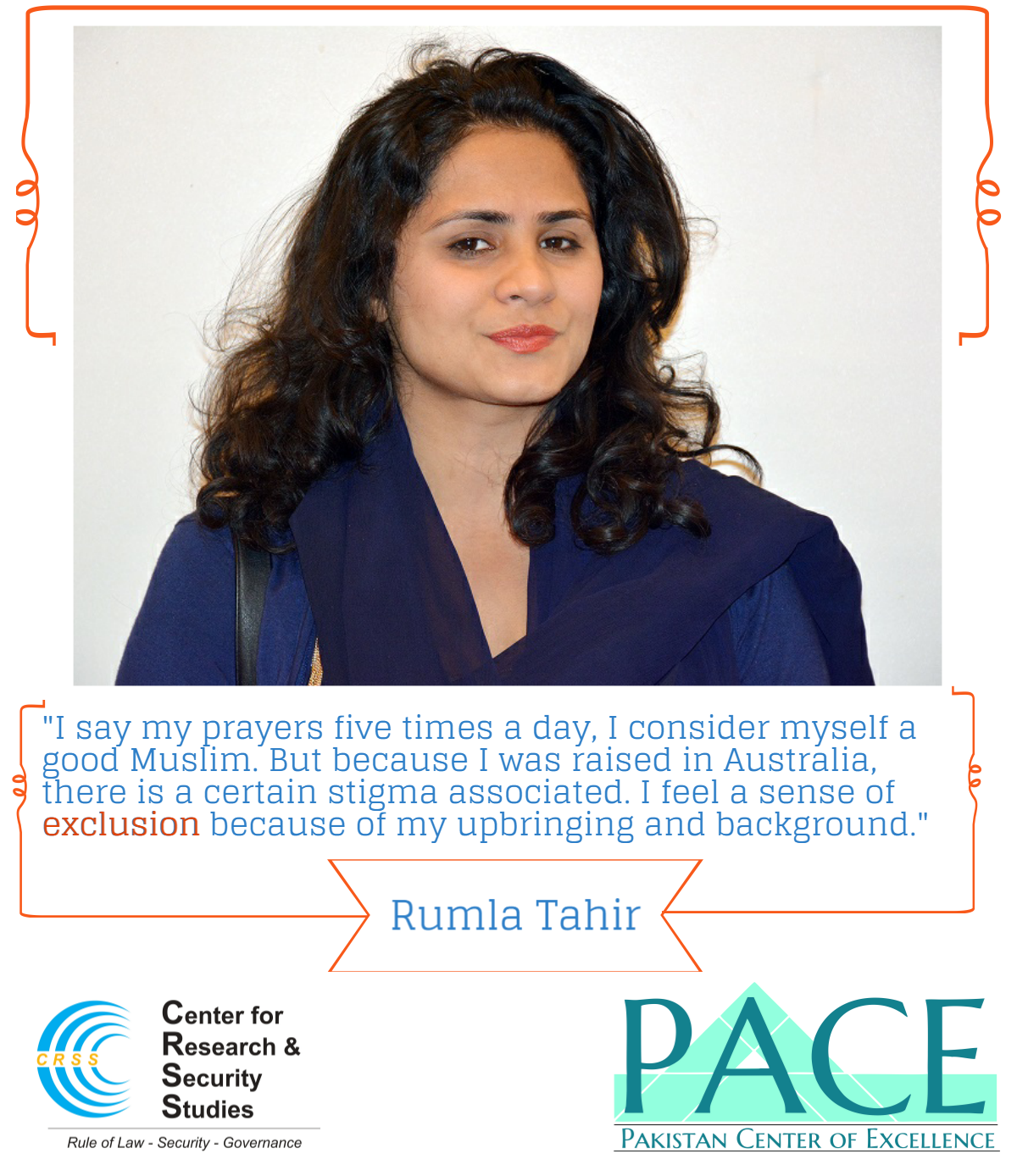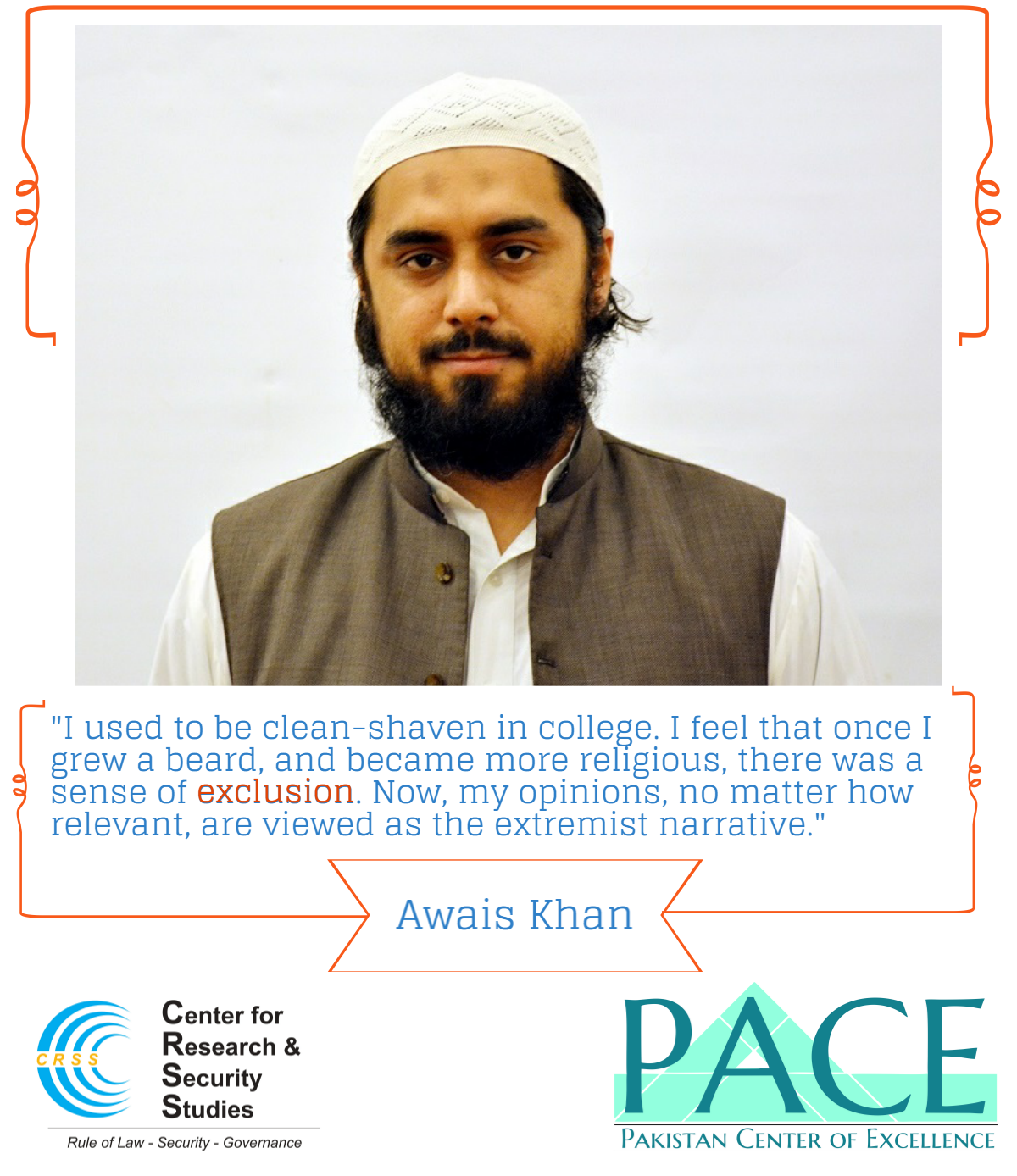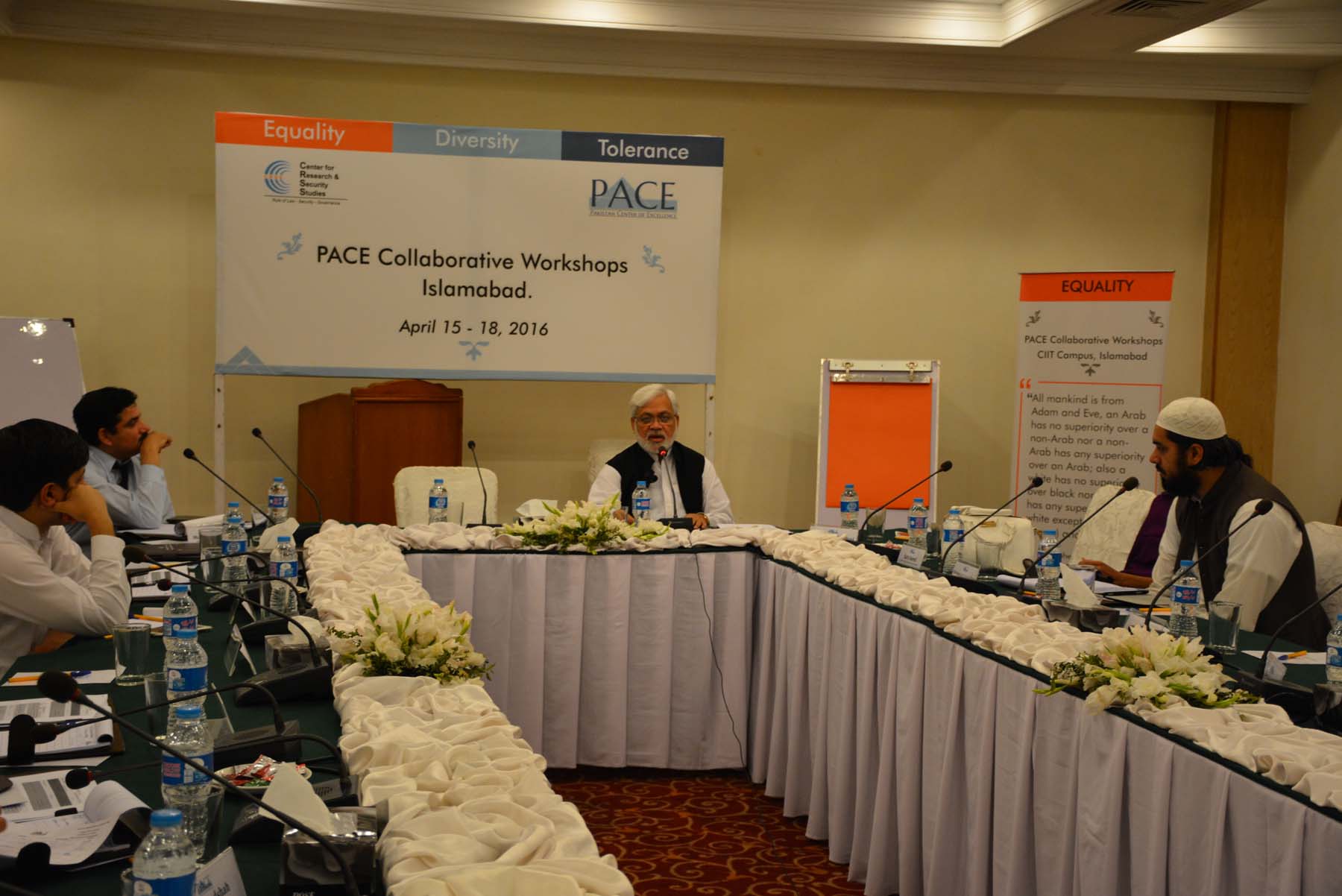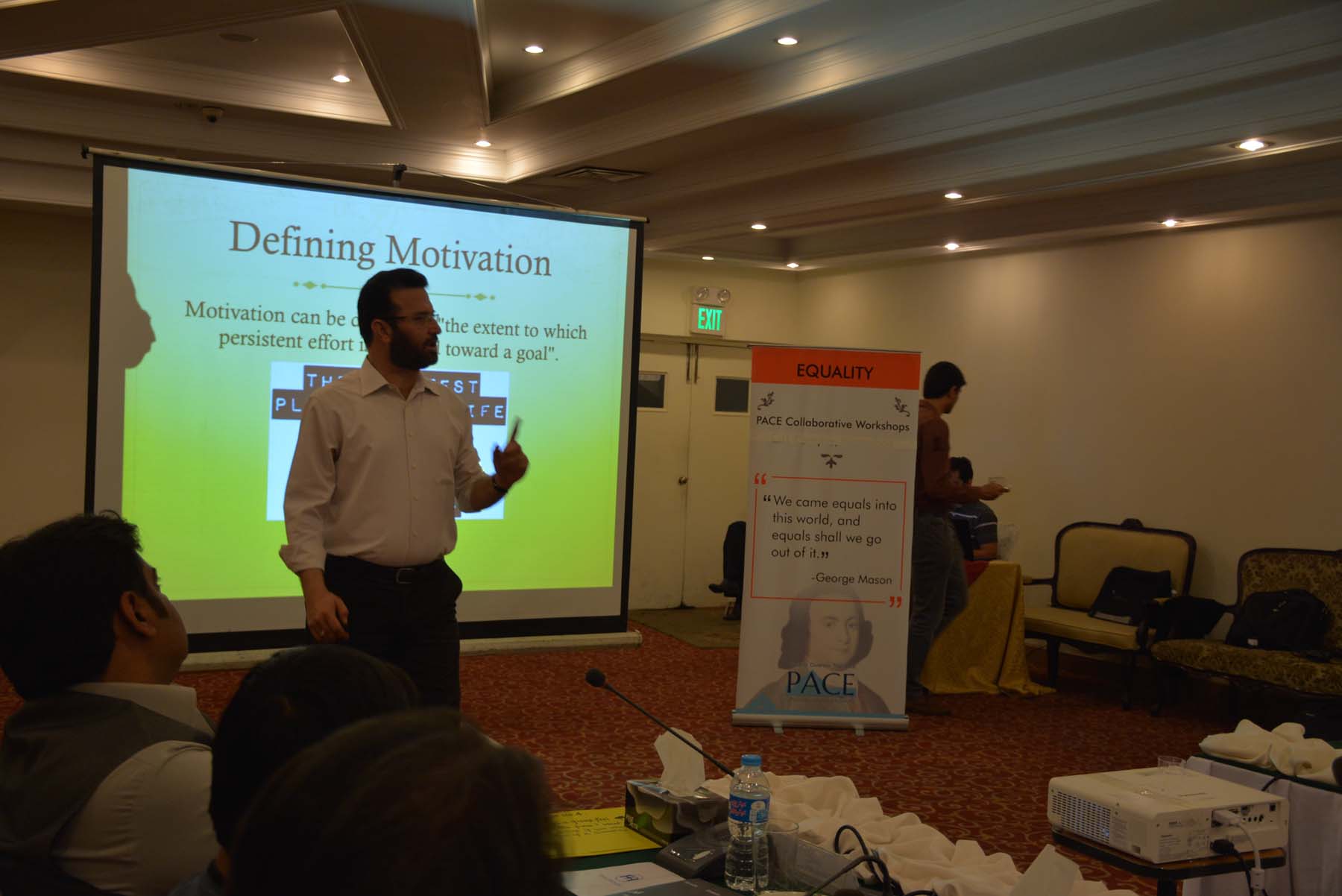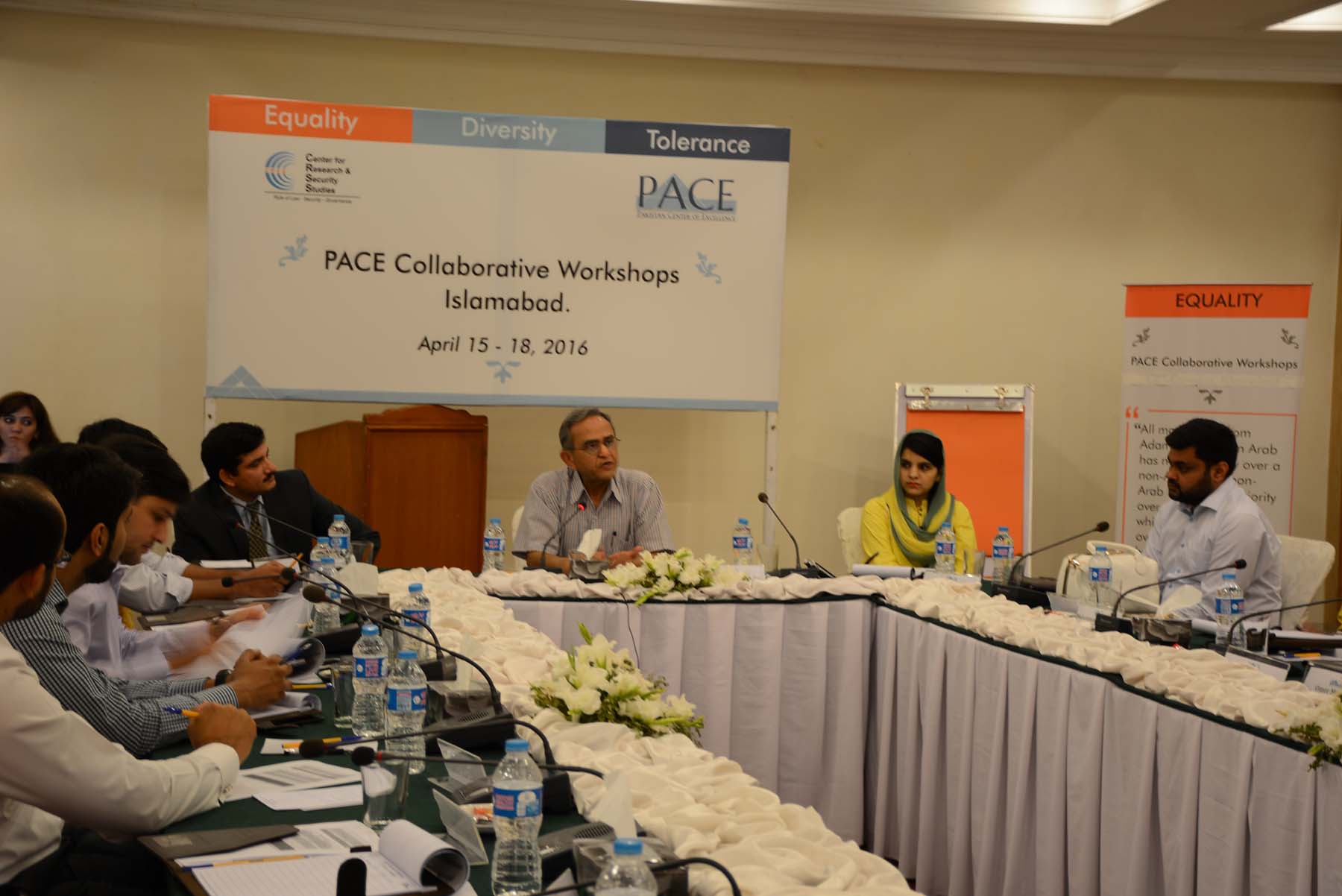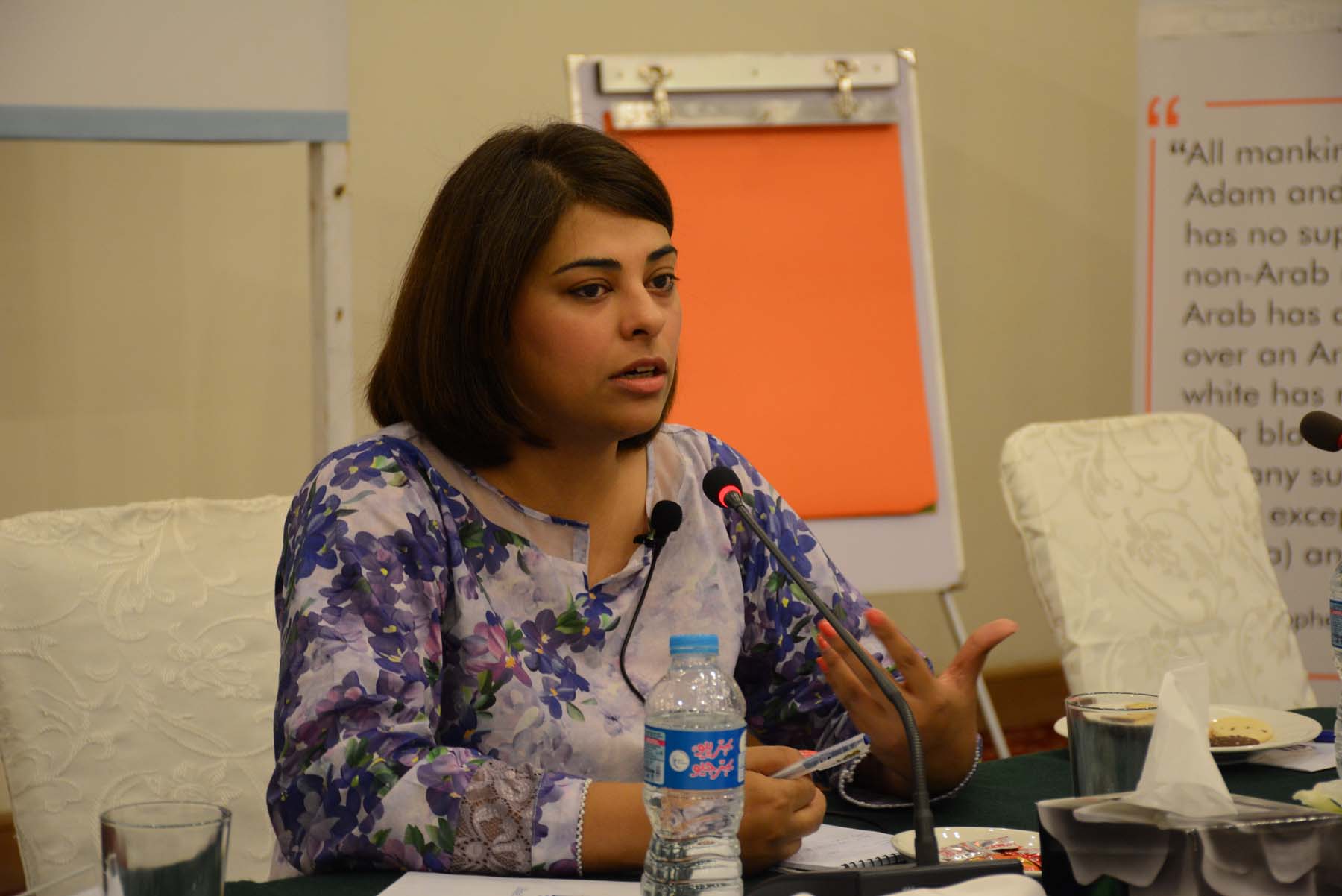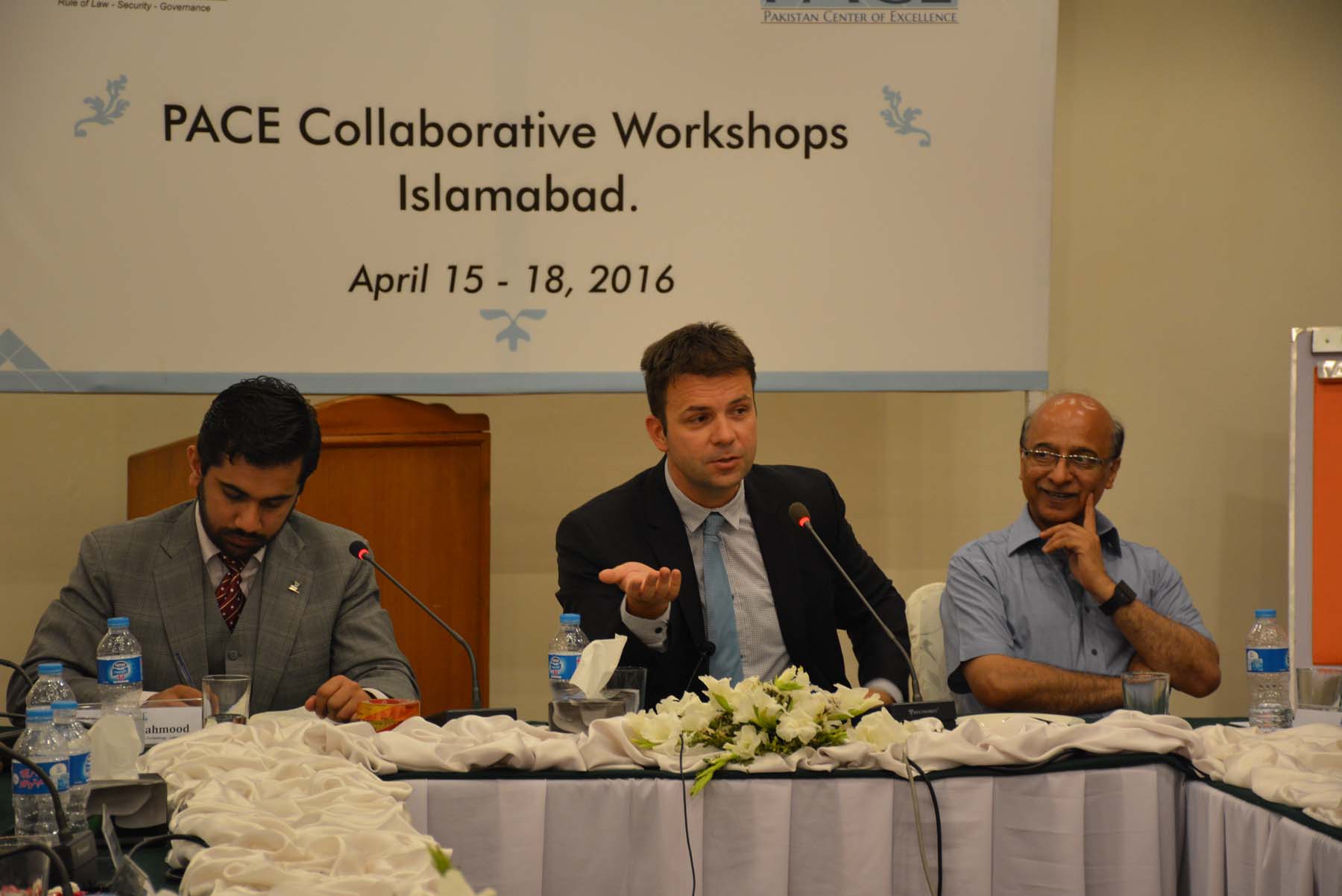The Center for Research and Security Studies (CRSS) conducted the second four-day collaborative workshop for young university lecturers and professors between April 15th and 18th, 2016 at Hill View Hotel, Islamabad. The workshop was conducted under the umbrella of the Pakistan Center of Excellence (PACE), a counter-radicalization, pluralistic values focused project, in collaboration with the Dutch Government. Participants included young university lecturers and professors from COMSATS Institute for Information Technology (CIIT), CECOS University, Quaid-e-Azam University (QAU), and the Department of Peace and Conflict Studies Department, Peshawar University (PU).
Mr. Zeeshan Salahuddin, Project Manager, welcomed participants to the workshop, saying that PACE is put together by CRSS to counter radicalization, inculcate critical thinking, question preconceived notions and narratives, and embed the national discourse in constitutionalism and the rule of law. He said that PACE is grounded in the universal values of tolerance and acceptance; tolerance is one virtue that leads to a range of other factors such as perseverance, coexistence and the idea of peace building.
[read more about Zeeshan Salahuddin]
Mr. Imtiaz Gul, Executive Director, CRSS, elaborated on the objectives of the training saying equal citizenry is a concept which is guaranteed in all the constitutions of the developed countries, including Pakistan. We need to consciously treat all Pakistanis as equal citizens and should respect their rights. He said that the primary objective of the workshop is to trigger critical thinking through a discourse anchored in fundamental global values such as socio-political diversity, acceptance of diversity, rule of law and equal citizenry. The idea is to create a critical mass of young leaders equipped with the skills to critically analyze issues, look at each other as equal citizens, and correct misconceptions about marginalized communities.
Workshop Core Areas
The young professionals were trained in following areas:
- Leadership and motivation
- Equal citizenry and respect for rule of law
- Fundamentals of democracy, governance and accountability
- Respect for diversity, opinions and rights
- Rights of minorities and other marginalized groups
- Constitutionalism, and adherence to Pakistan’s Constitution, particularly articles 8-28
- The importance of asking critical questions in the pursuit of knowledge
Workshop Modules
This cadre of young lecturers was trained by experts in the above mentioned fields including: Dr. Niaz Murtaza, Ms. Humaira Masihhuddin, Ms. Samina Yasmeen, Dr. Mohsin Naqvi, Mr. Safiullah Gul, Mr. Jahangir Khattak, Mr. A. H. Nayyar and Ms. Sara Farid.
Mr. Niaz Murtaza shared his views on the concept of democracy and good governance. He said that any institution at its initial stage is never stable, and the same is the case with democracy. But once it is stable and mature, democracy starts delivering.
“When we look back at the history of Pakistani politics, Pakistan has never been stable,” he added. It could never see the fruits of stable and mature democracy. Political scientists state that from stable institutions emerge egalitarian societies. Egalitarian societies are the ones where people have equal access to education, capital, opportunities and freedom. In such societies, strong institutions, able leadership and good governance emerge and development takes place.
[read more about Niaz Murtaza]
The second day of the workshop kicked off with social activist and advocate Ms. Humaira Masihhudin speaking on the theme of pluralism and multiculturalism. Human beings belong to one origin and one place. Very few societies in the world are homogeneous, there is no such society that exists in the modern world. Most societies consist of different ethnic groups. We may define minority as a group of people who are singled out from the other groups and differently treated, because of their physical or cultural characteristics. Minority is a subordinate group as opposed to the dominant group. When there is no respect for values and diversity, violent incidents take place in the society such as genocide, ethnocide, forced migrations and conversions.
“In Islam, the concept of diversity is clearly inclusive,” she continued. “In the Quran,” she said, “humans are addressed to treat one another without any discrimination and respect each other’s beliefs and should never use abusive language or show disrespect toward others. When we look at the character of the Holy Prophet (PBUH), he always respected the non-Muslim groups in Mekkah and Medina. Even when we talk about the day Mekkah was conquered by Muslims, the Holy Prophet forgave all of his enemies for what they had done to harm him. His last sermon included the lines, “All mankind is from Adam and Eve, an Arab has no superiority over a non-Arab nor a non-Arab has any superiority over an Arab; also a white has no superiority over black nor a black has any superiority over white except by piety (taqwa) and good action.” In short, Islam is the religion of tolerance and coexistence, love and peace for others even if they belong to different religious or cultural groups.”
[read more about Humaira Masihuddin]
The second speaker on the second day was Ms. Samina Yasmeen, who shared her views on the challenges faced by Muslims in western liberal societies. How do we define exclusion and what does inclusion mean? Initially the idea came about through French scholars who were talking about economic exclusion. If anyone, who is not benefiting from economic development of the society, is economically excluded, it affects the capacity of the person to be part of the society they exist in. People are not equally treated on the basis of language, culture, cast, religion and gender, among many other factors. Inclusion is bringing people into the mainstream making them feel like they are equally important. The question is how do Muslims live in western societies? The total Muslim population in the world is 1.56 billion, Muslims are considered as outsiders and a threat to society in many parts of the world, especially now that Islamophobia is on the rise. A sense of exclusion of Muslims started increasing with the London bombing. Islamophobia is increasing day by day; Muslims get treated badly by the people of the country they are living in. There is a dire need of changing the opinion by promoting interfaith relationships.
[read more about Samina Yasmeen]
On the third day of the workshop, Dr. Mohsin Naqvi opened the session with a speech on pluralism and respect for diversity. He elaborated that as far as pluralism and diversity is concerned, it is difficult to make people understand that their differences are sources of strength. One tends to develop a certain kind of attitude towards a certain ethnic, cultural and religious group, if brought up in an environment that is not tolerant. Argument and reasoning needs to be done in a positive way to correct conflicting views. Tolerance is something that expands with exposure to different levels and learning more about diverse groups. One should be open and accommodating to all the differences that exist in a diverse society. There are different systems of beliefs whether religious, cultural, economic or social, they may be equally correct for the people who believe in them.
Pro-existence means accepting others with all their beliefs, morals, characteristics and positive and negative traits wholeheartedly and vice versa. It can only be achieved only when we believe in pluralism, respecting and accepting the fact of being different.
Mr. Safiullah Gul, bureau chief for a private television channel in Peshawar, conducted a session on motivation and rule of law, where he emphasized the extent to which effort is directed toward a goal, and its components: activation, persistence and intensity. He encouraged debate among audience over the subject of constitution and rule of law and also informed them on how the FCR was promulgated by the British to govern the tribal areas at the time.
[read more about Safiullah Gul]
Mr. Jehangir Khattak, Senior Editor and Communications Director at Voices of New York expanded on how diversity in media can also help project traditions and culture. He said, “If you want to make a narrative, you have to be part of that narrative. You cannot bring in changes to the narrative and media attitude unless you don’t have the ability to influence the decisions and decision making process. Real impact would depend on the ability to write, participating in discussions, attending town hall and public meetings, being part of civic engagement etc.”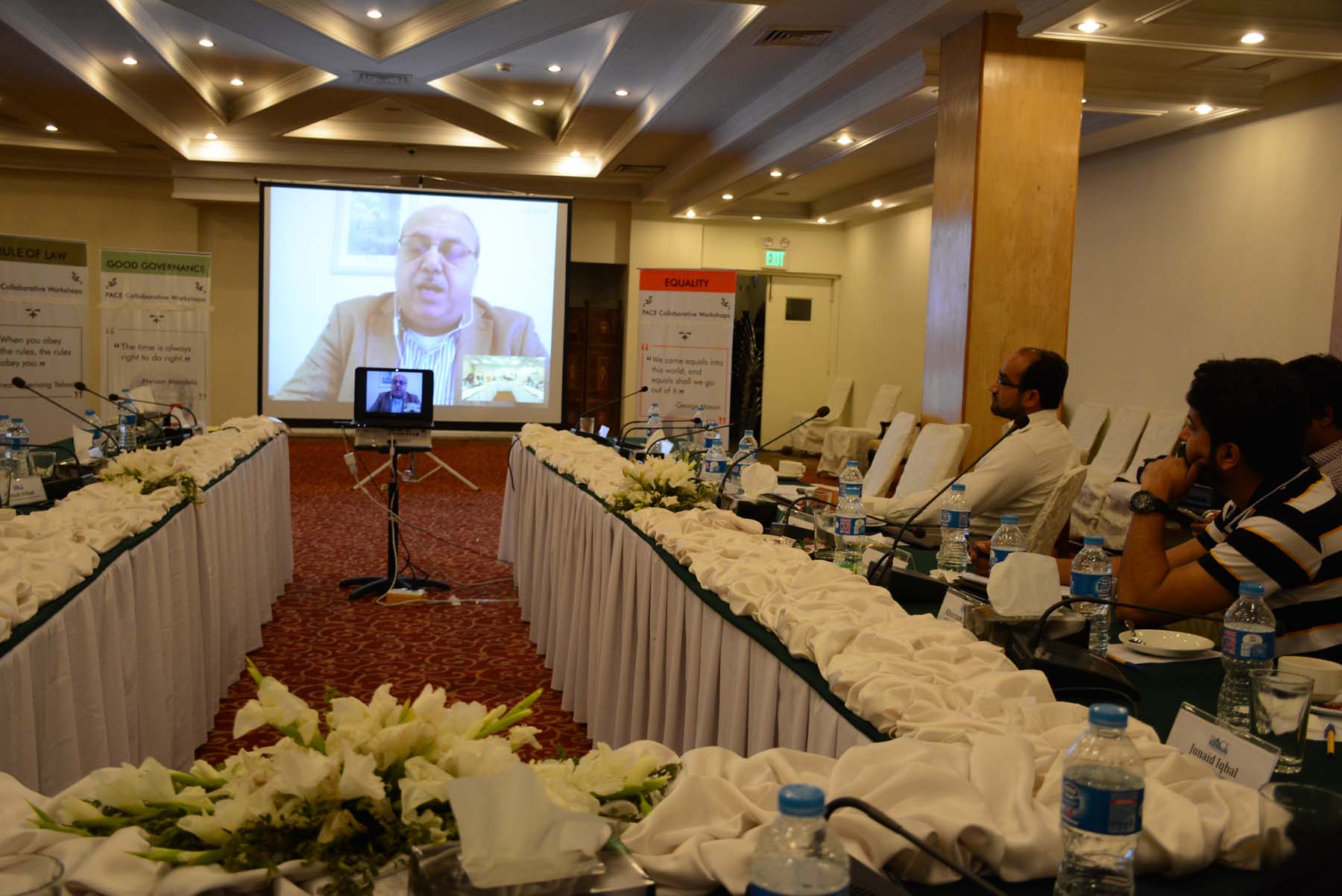
[read more about Jehangir Khattak]
Dr. A. H. Nayyar talked about how education can be helpful in inculcating critical life skills among the youth, such as equal citizenry, respect for rule of law, respect for diversity, rights and opinions. His lecture started with him highlighting issues that exist in our society due to which we are not able to provide equal citizenry to everyone. “Might is considered to be right and we do not show any respect for rule of law which presents a retrogressive image of our society. We are self-obsessed and support such ideologies which support this pattern of thinking,” he said. He also explained how important civic education was to make people aware of the sacrifices they have to make to accommodate each other for creating a tolerant and peaceful society.
Dr. Nayyar raised a very important point that despite a very rivalry-based antagonistic attitude towards India, we have no India Studies departments at any of our major learning institutions. This is bizarre, considering our national narrative paints India as our primary enemy. If this is true, he said, we should study our enemy in excruciating detail, not ignore it altogether.
[read more about A. H. Nayyar]
Ms. Sara Farid kicked off her session discussing the topic of media and ethics. The discussion included that media should consider norms and values of a society, selection of words and body language should match the cultural values. Sensationalism should be avoided and self-censorship should be considered. Biased and abusive attitude should not be accepted. She stressed on the importance of being neutral and presenting authentic news.
His Excellency Dr. Nedim Makarević, the Ambassador of Bosnia and Herzegovina to Pakistan was the chief guest during the closing ceremony of PACE’s second round of collaborative workshops, on Monday, April 19, 2016. “Bosnia and Herzegovina (BH) is a nation that exemplifies multiculturalism, pluralism and ethnic and religious diversity. Muslims, Christians and Jews coexist peacefully, crime is at zero, and literacy rate is at 100%. BH has created a law-abiding, peaceful, tolerant society, all without sacrificing its proud Muslim identity,” he said.
[read more about Nedim Makarević]
Imtiaz Gul, Executive Director, CRSS, said that it is important to keep politics and religion separate. The mark of a tolerant society is to seek knowledge, and engage in constructive, positive dialogue.

